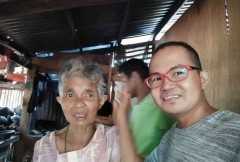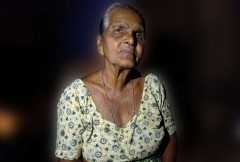

There are millions of Marcianas bringing up children of overseas workers in the true faith

My prayer book and rosary are my weapons in times of joy and sorrow, says Mary Hariyat a Catholic mother
For Gabriella Minj, a tribal Catholic mother living on the outskirts of India’s capital New Delhi, survival is a daily burden and hope is a luxury afforded only by faith.
The 44-year lives with her two teenage children and husband in a two-room house in the densely populated Khora colony in the eastern part of the city. The rooms take different shapes as a bedroom, study, sitting room, and kitchen at different times of day and night.
“We are lucky to have this place,” she said alluding to the millions of people, many of them tribal people like her from central India, who live in Delhi's slums.
Minj comes from Chhattisgarh, which has the ignominious distinction of being India’s poorest state where around 40 percent of people live below the poverty line.
“What you see or hear, you will forget. But what you experience can never be forgotten. It will remain with you forever,” says the slightly built woman while narrating how extreme poverty forced her to migrate from her village.
She arrived in the national capital two decades ago looking for a job to support herself and her large family back home comprising 10 members.

Gabriella poses for a photo with her husband Arun Minj. (Photo: Bijay Kumar Minj/UCA News)
Years of hard work and strong faith have helped her develop a steely resolve to ensure a better future for her children.
“I have great faith in Mother Mary. Whenever I feel sad and lonely I pray the rosary and every time my prayers are answered,” she says.
Thousands of Catholic migrants like Minj and her family now form the mainstay of the Catholic Church in Delhi, where some 140,000 Catholics form hardly one percent of some 13 million people.
Minj like other Christians becomes the face of the Church in her Hindu-majority locality and maintains a good rapport with her neighbors.
“They appreciate our simple life and fellowship. In fact, a couple of families in the neighborhood were so impressed with our faith that they wanted to convert to Catholicism,” recalled Minj.
But coming from Chhattisgarh and well aware of the hostility toward her faith even in the national capital, she suggested they rather meet the parish priest at Khora and nearby Mayur Vihar church.
Her husband Arun is proud of her and says: “She has become a symbol of a true Catholic woman for our Hindu neighbors. Maybe it is because of her simplicity and habit of extending a helping hand to anyone in trouble.”

Arun and Gabriella have two children — Preeti Maria, a daughter born in 2004 and a son Ashish Antoney born in 2005. Preeti completed her 12th standard this month and Ashish has just been promoted in standard 12 and both of them study at the Church-run St. Mary’s secondary school, Mayur Vihar. (Photo: Bijay Kumar Minj/UCA News)
Minj gives all credit to her “firm faith in Jesus.”
“Our faith has held us together. Prayer is the only answer for all our problems,” she affirms.
Minj believes that as a Catholic one does not have to do extraordinary things to please anybody, least of all humans, but one must be dedicated to work and do it with love and care.
Her only regret is not being able to pray as regularly as she would like to. “We do pray together as a family every day, but sometimes due to our hectic schedules we skip the evening prayer,” Minj admits.
The couple’s two children, daughter Preeti Maria, 18, and son Ashish Antoney, 17, are good at studies. Preeti is preparing for her grade 12 final examination while Ashish just completed his grade 11 examination. Both study in a church-run school.
Minj wants her kids to do well in life, both materially and spiritually.
“It is quite challenging for us with the children surrounded by their Hindu friends and the latest technology mobile phones and internet. But I make sure they are brought up as good Catholics. I ensure they attend Sunday Mass and participate in all church activities,” she said.
Minj says the family doesn’t have any particular church. There is one at the nearby St. Antony's School in Khora locality that the family attends on Sundays quite often.
“All four of us attend the regular Sunday Mass, often walking the distance. My husband has a motorcycle but since the children are now grown up it’s no longer convenient to ride on it,” she explained.
Minj takes great care in dressing herself for church, draping herself in a traditional white sari with a red border, wearing bangles on her wrists and sporting a vermilion mark on her forehead, indicating her commitment to the long-life and well-being of her husband like a true Indian wife.

Preeti and Ashish study in their bedroom. (Photo: Bijay Kumar Minj/UCA News)
But her most valued ornaments are her two children and she admittedly feels very happy and proud to see them seated in the front as members of the choir.
“In the church, my husband and I sit on a carpet. Men sit on the right side and with women, I sit on the left side of the altar. But our eyes are fixed on our children performing the devotionals,” she admits candidly.
The Eucharist at St. Antony’s is celebrated in Hindi which makes her feel more comfortable.
“I am conversant with the language and hence relate to it nicely,” says Minj.
Her husband Arun works at the school as a full-time staff driver while also running all sorts of errands for the parish priest. The church comes under the Archdiocese of Agra and both the church and school are managed by Franciscan fathers. (Franciscan Friars of the Third Order Regular Province of the Most Sacred Heart of Jesus or TOR)
The family holds their evening prayers at home. “I sit close to a small altar we have in our small house, sitting cross-legged on the bed, folding my hands and closing my eyes, I lead the prayer in Hindi. We have devotional songs and then read from the Bible,” Minj said.
She usually wakes up at 4.30 in the morning and prays silently sitting on the bed to avoid disturbing her husband and children. “I also remind and encourage each one of them to say a personal prayer in silence after getting up in the morning,” she added.
It’s been a long journey since she left her maternal home in Chhattisgarh for New Delhi in 1991, accompanied by her sister and a friend without finishing her schooling. She could manage to study only till Class 9 in the Church-run Holy Cross School in her native village.
“I wanted to study but the financial situation of my family did not permit me to continue in school,” she recalls with a tinge of regret.
Minj was the sixth among eight children born to Libnus and Agnesia Barwa, a marginal farmer in Gholeng parish in Jashpur district.
She remembers Gholeng as a typical tribal village surrounded by paddy fields, lush green trees, tiny streams and a small lake. Like the others in the village, her family too barely managed to subsist on farming and gathering forest produce.

Preeti and Ashish watch television in their bedroom. (Photo: Bijay Kumar Minj/UCA News)
Back home she would attend the Guardian Angels Catholic Church, which celebrated its centenary in February 2021.
Minj cannot forget the calm and peace of her village even after so many years spent working in New Delhi, initially as a domestic help before settling down to work as support staff at St. Mary’s Senior Secondary School in East Delhi’s Mayur Vihar area.
She married Arun Minj in 2003 and settled with him in the Khora colony, which was then an underdeveloped area in the neighboring state of Uttar Pradesh, lacking even basic facilities like a clean water supply and sanitation facilities.
Most of the residential and commercial buildings in the area are low-rise and densely laid out, but the poor and low-income groups prefer it for its proximity to the national capital which offers employment.
“My morning starts at 4.30 as I have to prepare both breakfast and lunch for the entire family,” Minj says.
The women from the neighborhood admire her cooking skills. “We are surrounded by Hindu families who eagerly await Easter and Christmas so they can savor the delicacies I prepare,” she says with pride.
But not everyone in the neighborhood comprising some 200 families is friendly. Some suspect the rare Christian family is out to convert them all and prefer to maintain their distance.
India’s Hindu nationalists often accuse Christians of using force and surreptitious tactics in pursuing conversions, which has had a palpable impact on the larger society in the past few years.
But Minj and her family have learned to take the suspicious looks in their own stride. What worries them more is the situation back home.
Several Christian families in Chhattisgarh have been attacked and ostracised in their villages in the recent past for their refusal to join the local tribal religion or convert to Hinduism.
A 2020 report by International Christian Concern (ICC) reveals how Christians have been prohibited from receiving food rations because of their faith. “Christians are paying a heavy price for following Jesus,” a village leader was quoted as saying in the report.

Gabriella stands in front of her house, sweeping and cooking. (Photo: Bijay Kumar Minj/UCA News)
Minj says that her fellow Christians back home are often accused of practicing a foreign faith and abandoning their ancestral tribal culture and tradition building up the pressure for them to return to the indigenous faith.
Many Christian families in Chhattisgarh have started to reconvert in recent years because of pressure. “The social boycott affects livelihoods and they even have to endure physical abuse,” she said.
Social boycotts in the tribal villages often include cutting off access to common facilities like water sources, transport and even employment opportunities.
The Christians report such incidents to authorities but no action is taken against those harassing and threatening their faith.
Social boycotts have been used by local radicals to pressure the Christians into recanting their faith. Across Chhattisgarh, they have been used to persecute Christians, said the ICC report.

Photo of Gabriella along with her family members standing inside St. Antony's church. (Photo: Bijay Kumar Minj/UCA News)
Living far away from their near and dear ones in the national capital, Minj and her husband can only pray for their safety and wellbeing.
Minj is also thankful to God for keeping her family hale and hearty in a city known to be ruthless toward poor migrants like hers.
It is a daily struggle for transport and other civic facilities for the Minj family but like all residents of the Khora colony, they’re thankful to have survived the days, months and years.
Minj says she feels truly blessed despite the poverty back home and the insecurities of living in a big city.